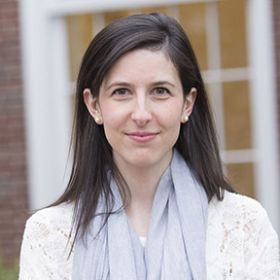People
Alexandra C. Feldberg
Alexandra C. Feldberg
“One of the best aspects of my experience has been getting to know my peers in both places. I have made amazing friends through the program, and I feel lucky that my peers will also be my future colleagues.”
I grew up in Concord, MA, a small town outside of Boston, famous for the Battle of Lexington and Concord, Walden Pond, Henry David Thoreau, and Louisa May Alcott. I majored in history at Columbia College in New York City, and after college I entered into management consulting. Through my project work, I developed a deep interest in gender and knowledge transfer in organizations. Although I enjoyed the analytical aspects of consulting work, I missed being in an academic environment. I realized that the depth, precision, and rigor of academic research appealed to me.
After I left consulting, I spent a year working at Columbia, taking classes, and doing research. I then moved across the country to San Francisco, where I completed a fellowship with Education Pioneers doing data analysis and strategy work for Teach for America.
I am thrilled to be back in academia, but I would not trade my work experiences for anything. These experiences constantly inform and guide my course of study.
Research Interests
My areas of interest are gender and knowledge transfer in organizations. Through my research, I hope to pursue such questions as: how do different types of knowledge get transported across groups in organizations? How does access to knowledge affect the inclusion of subgroups in organizational processes? In what ways does knowledge transfer impact the success of programs intended to promote equity in organizations?
Organizational Behavior Program
The joint structure of the Organizational Behavior program is simultaneously the most challenging and rewarding aspect of my experience at HBS. Being part of two campuses can sometimes be hard. I spend my days shuttling between the Organizational Behavior unit at the Harvard Business School and the Sociology department in Williams James Hall.
While it is a lot of work — twice the email listservs, administrative meetings, and program requirements — it is hugely rewarding. One of the best aspects of my experience has been getting to know my peers in both places. I have made amazing friends through the program, and I feel lucky that my peers will also be my future colleagues.
Advice for prospective HBS doctoral students
There’s a lot of pressure to follow certain prescribed paths. We look to models — from parents to peers to mentors — to guide our decisions. It can be tempting to “follow the crowd” (or, according to organizational theory, engage in “mimetic isomorphism”).
As cliché as it may sound, sometimes the path least traveled is best. Figure out what motivates you and makes you happy. Try as best you can to separate it from others’ expectations or beliefs about what you should be doing. In the end, you will be happiest and most successful if you choose a path that suits you.
Take this advice to heart especially if you are in the midst of applications. Be specific about what you find interesting. Of course, your interests may change. But because programs differ widely, it is important to know yourself first so you can articulate your aspirations for graduate pursuits clearly and make an informed decision about programs.
While this advice certainly holds in the application process, I think it also extends into graduate programs. In the doctoral programs at HBS and other business schools, opportunities are abundant. Because of this, knowing yourself will ultimately allow you to be purposeful, focused, and productive in your research.

